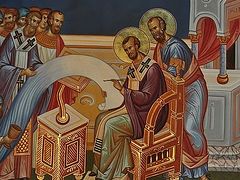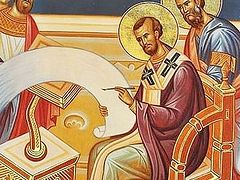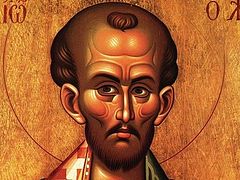“Married love is the strongest kind of love… And in the age to come, a faithful married couple will meet without reservation to dwell for eternity with Christ and share great joy.”
“There is nothing more precious than to love and to be loved by your wife. When a husband and a wife live in harmony, a man of wisdom reckons it to be one of the beatitudes. Whoever has it, will also gain every other sort of wealth and happiness.”
“Bodily beauty wears away over time and gets destroyed by illness, but spiritual beauty is beyond all changes.”
“Procreation has become the greatest consolation to people once they became mortals. That’s why God, Who loves us so, instantly softened the effect that His punishment had on our forefathers and reduced their fear of death by bestowing procreation… as the foreshadowing of the resurrection.”
“Even if we led untroubled life, we would still be subject to strict punishment if we didn’t care about the salvation of our children. Children weren’t born by chance and we are held responsible for their salvation.”
 These wise sayings, which we should heed even in our times, were written over one thousand and five hundred years ago! They were authored by St. John Chrysostom, the greatest man of faith and homilist par excellence.
These wise sayings, which we should heed even in our times, were written over one thousand and five hundred years ago! They were authored by St. John Chrysostom, the greatest man of faith and homilist par excellence.
St. John was born in 347 AD to a noble family from Antioch. Having lost his father early in life, he was brought up by his mother Anthousa, an exemplary Christian woman. Generously gifted by nature, John received outstanding education as he studied at Libanius, the renowned pagan orator. John was so successful in his studies at school that when the teachers asked Libanius who he thought was worthy to become his successor, he replied: “By all means, John, had the Christians not taken him away from us.”
At age eighteen, John traveled to Athens to further refine his skills in rhetoric and philosophy. Upon his return to the native town of Antioch (in today’s Syria), John was baptized at the age of twenty as was customary at the time. Bishop Meletius of Antioch was the one who baptized John and it was also him who made him a church reader. John remained a reader for three years while he diligently studied the Holy Scripture.
After his mother’s death, John gave away his possessions, freed the slaves and settled in a remote monastery, content in the company of his fellow monks. Later on, he lived alone in the seclusion of a cave for two years. However, due to ill health caused by excessive asceticism, he was forced to return to Antioch—as it probably was according to God’s providence, for “such a great luminary shouldn’t have remained hidden under a bushel in the desert but instead had to shine his light on everyone.”
In 381, at the age of thirty-four, John was ordained deacon and became a priest five years later. The following twelve years in Antioch where he served as a priest turned out to be the happiest time of his life. Presbyter John ardently followed the commandment of caring for the poor: During his ministry there, the church would provide sustenance to as many as three thousand virgins and widows every day, not counting the sick, wanderers, and those in jail.
At that time, he authored a considerable number of theological treatises, in particular, “About Providence,” “Treatise on Chastity,” “To a Young Widow,” and others. Presbyter John was a tireless preacher – his outstanding sermons (improvised, for the most part) were often interrupted by the applause and weeping of his listeners. Thanks to shorthand scribes, many of them have survived to our time. He left inspirational renditions of many books of the Holy Scripture in his numerous pastoral treatises (numbering over eight hundred!). St. John is now considered by the Church to be one of the most influential exegetes.
His reflections about the system of human relations based on Christian faith, Christian family, the upbringing of children, prayer at home and in a community of believers, the meaning of a parish church, the duty to care for the common good, about Christian mutual support and works of mercy, abolition of slavery and bloody circus games have become classics of Christian literature.
Soon, his fame as John Chrysostom (or Golden-Mouthed, as he was so aptly and excitedly сalled by a parishioner after one of his homilies) resounded throughout the Christendom. That’s why, when the see of Constantinople became vacant after the death of hierarch Nectarius, Emperor Arcadius willed for John Chrysostom to succeed him. This landmark event took place in 398 AD when St. John was slightly over fifty years old.
With great passion, the new hierarch concerned himself with questions of weeding out the remaining traces of Arian heresy, the reconciliation of the warring bishops, and the spiritual perfection of the priesthood. In his zeal to spread the Christian faith, he sent experienced preachers to Celtic and Scythian tribes and also demolished the pagan temples built in Phoenicia many centuries before… The archpastor of Constantinople “fed the hungry and clothed the naked,” took care of widows and orphans, organized hospitals and other philanthropic institutions, in many cases at his own expense.
St. John went to considerable lengths to arrange for magnificent church services. He complied the order (rite) of a Liturgy, a number of prayers, and introduced processions with the cross into church use. St. John paid special attention to church singing. “Nothing more elevates and uplifts the soul,” he wrote, “nothing more tears it away as powerfully from earthly cares, and nothing else better invites it to godly love than a sacred hymn… A spiritual hymn is the source of sanctification; its words purify the soul and the Holy Spirit descends on the souls of singers because they who consciously sing psalms truly invoke His grace upon themselves.” He introduced antiphonal singing, namely, the alternating singing of two choirs.
The lax morals of people in the capital, especially at the imperial court, found the fiercest critic in the person of the new hierarch. His position as the fervent advocate of holy Christian faith alienated him from many people, including Empress Eudoxia, a power-seeking and money-hungry woman. St. John could not fail to notice the spiteful attitude surrounding him, but he paid no heed to this. The more he was vilified, the louder his fame resounded; he became known in many countries and people traveled from afar hoping to see the saint and to listen to his preaching.
But his enemies wouldn’t quiet down. With the help of Archbishop Theophilus of Alexandria, a central figure in the circle of bishops displeased with St. John, Eudoxia convened a council consisting of Chrysostom’s personal enemies where he was condemned for the most trifle and false charges (one, in particular, stated that he, so to speak, “knows no hospitality laws”). St. John was deposed of his see and banished from Constantinople.
That same night there was an earthquake in Constantinople. Terrified at the sight of an obvious display of God’s wrath, Eudoxia pleaded with Chrysostom to return to the capital. Yielding to urgent requests, St. John returned to Constantinople.
Two more months passed… Eudoxia resumed her life of evil passions; and again, St. John did not remain silent but openly denounced her. This time around, he was condemned in his absence and exiled. It took place in 404.
For three years, the elder resided in the Armenian town of Cucusus and was later taken even further away to Pityus in Abkhazia (near today’s Pitsunda).
For three months—in scorching heat and pouring rain—the military escort led the holy man, exhausted to the last degree, by foot across the mountains… One day, they stopped to rest in Comana (not far from Sukhumi).
At night, Holy Hierarch John Chrysostom beheld a vision of Holy Martyr Basilisk, whose relics remained in this town, who said: “Despair not, brother John! Tomorrow we shall be together.”
The saint’s prophecy didn’t take long to come true. The next day, on September 14, 407, St. John Chrysostom, the Archbishop of Constantinople, fell asleep in the Lord at the age of 59, and his last words were, “Glory to God for all things!”
Considering that the Feast of the Elevation of the Holy Cross is celebrated on September 14/27, the feast day of St. John Chrysostom has long been transferred to November 13/November 26.



